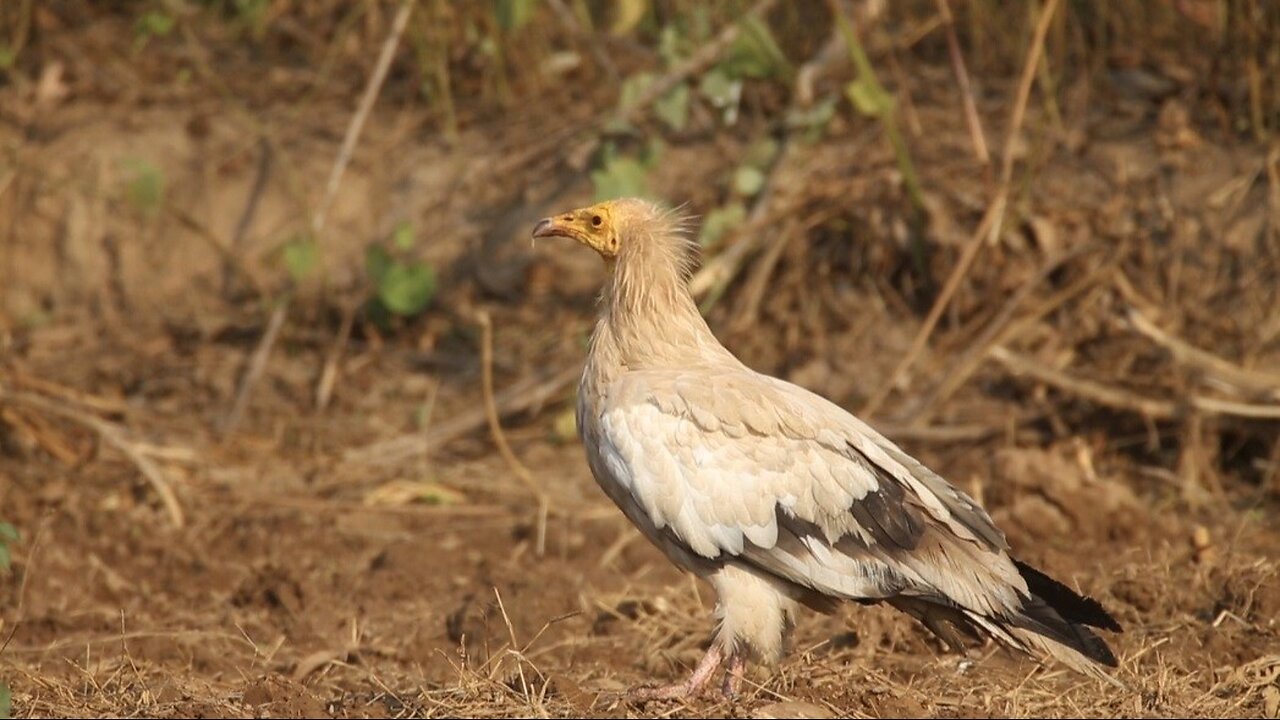Premium Only Content

"Majestic Egyptian Vulture: Nature's Cleanup Crew in Action"
The Egyptian vulture (Neophron percnopterus) is a striking bird of prey known for its distinctive appearance and vital role in the ecosystem. Here’s an overview of its key characteristics and importance:
Physical Features:
Size: Medium-sized vulture, with a wingspan of about 1.65–1.7 meters (5.4–5.6 feet).
Plumage: Adults have white plumage with contrasting black flight feathers, a sharp contrast when they soar in the sky.
Head: Its small, bare, yellowish face is unmistakable, with piercing dark eyes.
Beak: The slender, hooked beak is perfectly adapted to scavenging.
Tail: A wedge-shaped tail, adding to its aerodynamic form in flight.
Behavior and Feeding:
Diet: Egyptian vultures are scavengers, primarily feeding on carrion (dead animals), which helps prevent the spread of disease by cleaning up decaying matter in their environment.
Tools: Uniquely among birds, Egyptian vultures are known for using tools. They use rocks to break open large eggs, such as those of ostriches.
Role in the Ecosystem: They play a crucial role in maintaining environmental health by consuming waste and reducing the presence of harmful bacteria and pathogens in decaying carcasses.
Habitat and Range:
Geographic Distribution: These vultures are widespread, found across southern Europe, North Africa, and parts of the Middle East and Central Asia. They prefer open landscapes like savannas, deserts, and semi-arid areas.
Migration: Many populations of Egyptian vultures are migratory, traveling between breeding and wintering grounds.
Conservation Status:
Threats: The Egyptian vulture is currently classified as "Endangered" by the IUCN. Major threats include habitat destruction, poisoning (often due to ingesting lead or toxins from carcasses), and collisions with wind turbines or power lines.
Conservation Efforts: Conservationists are working to protect this species through breeding programs, anti-poisoning campaigns, and habitat preservation.
Cultural Significance:
Symbolism: In ancient Egypt, the vulture was a symbol of protection and motherhood, often associated with the goddess Nekhbet. Egyptian vultures were revered for their role as nature’s cleaners, safeguarding the environment.
This species is a fascinating example of how nature's less glamorous creatures play a vital part in maintaining ecosystem balance, and their majestic presence in the wild highlights the interconnectedness of all life.
-
 1:37:26
1:37:26
Redacted News
2 hours agoHIGH ALERT! DID UKRAINE JUST DECLARE WAR ON HUNGARY? ZELENSKY DEMANDS MORE CASH FROM NATO | REDACTED
115K56 -
 LIVE
LIVE
Akademiks
5 hours agoDrake got finessed w/ Fake Chain? Drake vs hip hop media. Cardi B in court. Did Young thug SNITCH?
1,009 watching -
 9:00
9:00
Zach Humphries
1 day agoXRP and CARDAO working together now?
46 -
 58:42
58:42
Sarah Westall
2 hours agoIt’s Big Big Money – Trafficking People is Intertwined in Business & Politics w/ Natly Denise
6.19K2 -
 LIVE
LIVE
LFA TV
12 hours agoLFA TV ALL DAY STREAM - TUESDAY 8/26/25
1,150 watching -
 1:49:34
1:49:34
The Quartering
5 hours agoToday's Breaking News With Melonie Mac & Hannah Claire Brimlow!
153K182 -
 23:16
23:16
Jasmin Laine
3 hours agoCarney HUMILIATED by German Reporter—CTV Host Laughs as Liberals Get DESTROYED on Air
11.9K12 -
 1:04:59
1:04:59
The HotSeat
3 hours agoLisa Cook Blocks Your Mortgage Relief While Committing Mortgage Fraud – YOU’RE FIRED!
15K13 -
 58:54
58:54
The Tom Renz Show
2 hours agoJudges Are Completely Immune From Lawsuits
9.54K1 -
 1:18:46
1:18:46
Awaken With JP
4 hours agoCracker Barrel Makes Brilliant Decision, Trump Bans Flag Burning and More - LIES Ep 105
56.8K37